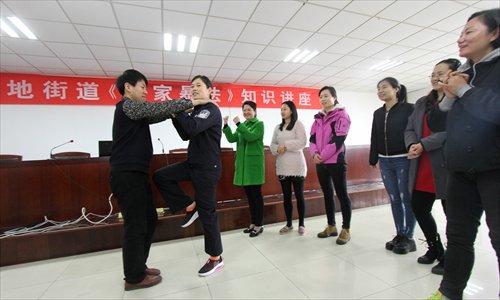Seeking legal help brings shame on Chinese domestic violence victims despite law
On March 1, China's first anti-domestic violence law came into effect. While many applaud this step, some believe that the law will not help victims of domestic violence unless they can be encouraged to break the taboo about discussing family problems with outsiders and reach out for help.

A policewoman shows women how to protect themselves from attacks in Hefei, East China's Anhui Province, March 7. Photo: IC
When Li Dan (pseudonym) first hit his wife about four years ago, she told him she would go to the village's women's rights committee, but in reality she didn't tell anybody, not even her own parents. She was afraid of what people might say.
Li and his wife were living in a village at the time. When he laid his hands on her, she was six months pregnant with their son. But domestic violence was quite common in their community, which was why his wife was hesitant to speak out. It was not unusual in their community to see men slap their wives in public because of something they said.
When she finally said something to her family, her parents, while angry at Li, also said to her, "It must've been something you said. Why would he hit you for no reason?"
For many years, victims of domestic violence in China have had to endure such situations because there are few avenues open to those seeking help. The traditional idea that what happens inside the family should be kept secret has also kept many lips sealed.
The new Anti-Domestic Violence Law which came into effect on March 1 has been seen as a broad step forward, defining domestic violence as physical or psychological harm and laying out punishments for assaulting, restraining, injuring or imprisoning one's family members, and verbal threats or abuse. However, more resources and help are required to encourage women to come forward and to then help them when they do.

Law and emotion
The new law hasn't brought any consolation for Wang, a domestic violence victim in Beijing. She got married not long ago and her husband soon started beating her.
At first she didn't take it seriously. She said they've gotten into quarrels in the past and both of them had gotten physical with the other. But then the violence on his part grew more and more intense. He would even grab her by the hair and smash her head against the wall.
When Wang finally couldn't take it anymore and consulted a lawyer, her husband started apologizing to her and promised he wouldn't hit her again. He also confessed that he had depression and blamed that for his actions.
Right now, Wang is in the process of filing for divorce, but she said she hasn't finalized it because she still has a soft spot for her husband.
"I understand everything perfectly," she said. "I just can't make a decision right now."
Though her parents and friends keep pushing her go through with the process, the final decision still lies with her, Wang said.
She and her husband lived apart for some time, when she was determined to get a divorce. But after a while, she started thinking of taking him back, and hopes he could change.
But in reality, people who have a history of domestic violence rarely change without professional intervention.
Wang's lawyer told her about another case she handled, in which a woman sued her husband and they made it to court. In the court, her husband cried and begged for her forgiveness, and she changed her mind about the divorce. But after they got back together, the abuse started again and the woman was back to square one.
According to statistics from All-China Women's Federation, domestic violence has affected 24.7 percent of families in the country, and most of the victims are women or children. Their data also shows that on average it takes 35 violent incidents before victims will report their abuser to the police.
Zhang Zhihui, the director of the consulting department of grass-roots anti-domestic violence NGO the White Ribbon Hotline, said he has received phonecalls from people who can't make up their minds about leaving a relationship.
"They all feel attached in different ways, some because of children, some because of financial entanglement, some worry whether they can find happiness again," he said.
Some can't reach a decision because of the traditional view that what happens inside a family should stay behind closed doors.
An article in the Nanjing-based Yangtze Evening News reported last year that a 50-year-old woman was been abused by her husband for over a decade, but she never told anyone about it, because she thought being beaten by her husband was a scandal that needed to be kept quiet. It was not until this August, when her neighbor reported this case to the police, that she was able to leave the relationship.

All-society mechanism required
Besides victims keeping their mouths shut, there are outside factors that keep them in violent relationships.
Two days after the law came into effect, Feng Yuan heard about a woman in East China's Anhui Province who was forced into marriage after being forcibly restrained by her family after she went on the run to avoid marriage. Feng, a women's rights advocate and co-founder of Equality, an NGO that focuses on gender issues, wrote for Shanghai-based news portal thepaper.cn that though the police were alerted, once they confirmed with the family that the woman was legally married, they did nothing.
"In many cases, abusers or their supporters don't think they are committing domestic violence, but rather think of it as a natural reaction as friends or family members … they believe they are looking out for their family members' best interest," Feng wrote. "That's why we need to broadly advertise the anti-domestic violence laws and advertise rights family members have."
Wang said during the entire process, she felt she was discriminated against. When some friends heard about what she's going through, they blatantly said to her, "You chose this husband yourself, so you better toughen up."
She feels people's awareness of domestic violence is still low.
"It doesn't matter that there's a new law now, a lot of the times it still depends on the domestic violence victims to reach out to the outside world first, to take that essential step and seek help," she said.
Furthermore, even with the new law in place, there are still issues of execution at the local level, Zhang said.
Right now, the organization in charge of supervising women's rights is the All-China Women's Federation, which played an important role in passing the anti-domestic violence law. The federation can give advice to victims of domestic violence but has few practical resources such as shelters to offer women. Without the government establishing shelters and providing funds, it can't go too far in terms of providing help, Zhang said.
Furthermore, when most talk about domestic violence victims, they think of women, think of wives. But in fact, men and children can be victims as well, Zhang said, and in most cases, it's even more difficult for men to seek help because they consider it an embarrassment.
He calls for more publicity on the matter to spread awareness. Besides, there needs to be a lot of policy support and an all-society mechanism to fight domestic violence.
The new law orders related institutions, including the victim's employers, residential community and local women's federation to provide support once they receive a call for help, however, as Chinese traditions relish family unity and view splitting up couples as wrong, these institutes also tend to persuade women to work on their relationship rather give them practical help.
Last week, Chutian Metropolis Daily reported that two workers at a civil affairs bureau in Wuhan, Central China's Hubei Province "saved" more than 500 marriages over nine years by falsely telling people their printer is broken or their Internet is down, so that they can't register for divorce.
The workers were widely criticized. Many commented if there were cases of domestic violence involved, they would be ending victims' hopes by not allowing them to get divorced.
"Lawyers, psychologists, social workers, hospital workers, people from all these fields need to know what domestic violence is, how to intervene and help these groups, and what kind of knowledge and ability they need to be equipped with," Zhang said.
Newspaper headline: Blaming the victim